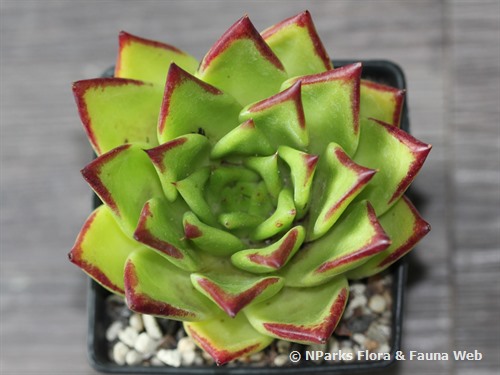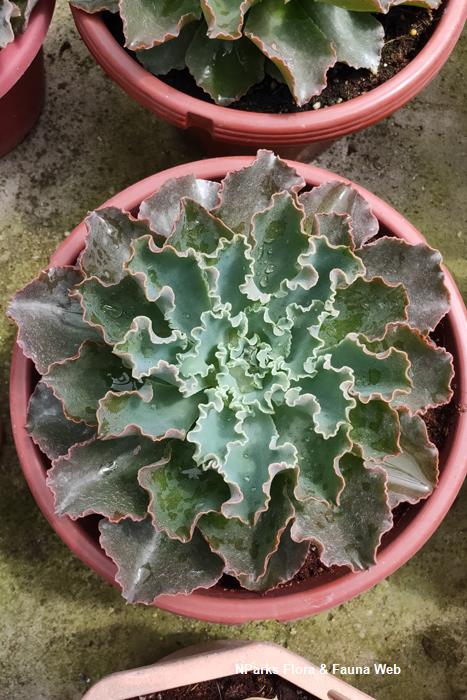
Back
Echeveria runyonii 'Topsy Turvy'
| Family Name: | Crassulaceae |
| Common Name: | Silver Spoons Echeveria, Mexican Hens and Chicks |
Name
Classifications and Characteristics
| Plant Division | Angiosperms (Flowering Seed Plants) (Dicotyledon) |
|---|---|
| Plant Growth Form | Succulent Plant |
| Lifespan (in Singapore) | Perennial |
| Mode of Nutrition | Autotrophic |
| Plant Shape | Rounded |
| Maximum Height | 10 cm to 20 cm |
| Maximum Plant Spread / Crown Width | 15 cm to 25 cm |
Description and Ethnobotany
| Growth Form | Forms a compact, rounded mound up to 20 cm wide. |
|---|---|
| Foliage | The light blue to silvery, fleshy leaves store water which can help the plant survive drought. The leaf edges are folded or curved down along the midline, turning upwards in an upside down V-shape at the leaf tip. |
| Flowers | Yellow and orange flowers are produced along an inflorescence up to 0.2 m tall. |
| Cultivation | Echeveria tends to be difficult to grow in Singapore, because it is native to a warm, dry climate that has a significant temperature difference between day and night (about 10 degrees Celsius). Locally, it is best grown indoors in an air con environment with bright, indirect light. Avoid wetting the leaves which can lead to rot and promptly remove dead leaves which can attract pests. Watch out for mealy bugs and aphids which can be controlled with rubbing alcohol. |
| Etymology | The genus is named after the botanist who discovered it in the 19th century, Antansio Echeveria. |
Landscaping Features
| Desirable Plant Features | Ornamental Foliage, Ornamental Form |
|---|---|
| Landscape Uses | Interiorscape/ Indoor Plant, Container Planting |
| Thematic Landscaping | Rockery / Desert Garden |
Plant Care and Propagation
| Light Preference | Semi-Shade |
|---|---|
| Water Preference | Little Water |
| Rootzone Tolerance | Drought Tolerant, Well-Drained Soils, Alkaline high pH Soils, Low Humidity / Aircon |
| Diseases | Root rot |
| Pest(s) | Sucking Insects |
| Propagation Method | Leaf Cutting |
Foliar
| Foliage Retention | Evergreen |
|---|---|
| Mature Foliage Colour(s) | Blue, Silver / Grey |
| Mature Foliage Texture(s) | Smooth, Powdery / Waxy Bloom, Thick |
| Prominent Young Flush Colour(s) | Blue, Silver / Grey |
| Foliar Modification | Storage Organ |
| Foliar Type | Simple / Unifoliate |
| Foliar Arrangement Along Stem | Rosulate / Rosette |
| Foliar Attachment to Stem | Sessile |
| Foliar Shape(s) | Non-Palm Foliage (Obovate) |
| Foliar Margin | Entire |
| Foliar Apex - Tip | Acute |
| Foliar Base | Attenuate |
| Typical Foliar Area | Microphyll ( 2.25cm2 - 20.25 cm2 ) |
Floral (Angiosperm)
| Flower Colour(s) | Orange, Yellow / Golden |
|---|---|
| Flower Grouping | Cluster / Inflorescence |
| Flower Symmetry | Radial |
| Individual Flower Shape | Stellate / Star-shaped |
| Inflorescence Size | 0.2 m |
Image Repository
Others
| Master ID | 33778 |
|---|---|
| Species ID | 8194 |
| Flora Disclaimer | The information in this website has been compiled from reliable sources, such as reference works on medicinal plants. It is not a substitute for medical advice or treatment and NParks does not purport to provide any medical advice. Readers should always consult his/her physician before using or consuming a plant for medicinal purposes. |






